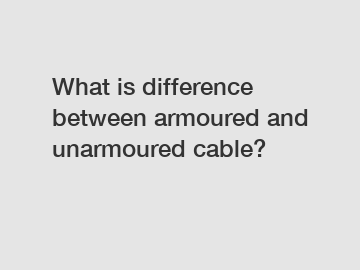Jan. 13, 2024
Electrical Equipment
RUITIAN contains other products and information you need, so please check it out.
In the world of electrical wiring, the terms "armoured" and "unarmoured" cables are often thrown around. However, for the uninitiated, these terms might sound like technical jargon. To shed some light on this subject, we will explain the differences between armoured and unarmoured cables, offering insights into their applications and benefits. So, let's dive into the world of electrical cables and unravel the mysteries behind these two terms.
What are Armoured Cables?

Armoured cables, also known as armored or AC cables, are designed to provide enhanced protection for electrical installations. These cables consist of a central conductor core made of copper or aluminum, surrounded by layers of insulating material such as PVC (Polyvinyl Chloride) or XLPE (Cross-linked Polyethylene). The distinctive feature of armoured cables lies in the additional layer of protection—a metal sheath that envelops the entire cable assembly.
Understanding Unarmoured Cables:
In contrast, unarmoured cables are devoid of the protective metal sheath. They generally feature a similar construction to armoured cables, comprising a central conductor, insulation material, and an outer layer. However, without the added layer of armor, unarmoured cables are more flexible and lighter compared to their armoured counterparts.
Applications of Armoured Cables:
Armoured cables are extensively used in installations where durability and resistance to external factors are crucial. Common applications include underground installations, direct burial, and underwater cabling. The armored layer shields the conductors from damage caused by mechanical stress, water ingress, chemicals, and even rodent attacks. Armoured cables are ideal for industrial environments, power distribution networks, and other areas where additional protection is necessary.
Benefits of Armoured Cables:
1. Enhanced Protection: The metal armor serves as a reliable protective shield against physical damage, safeguarding the cables from external elements or accidental impacts.
2. Durability: Armoured cables are built to withstand tough conditions, making them suitable for installations in harsh environments. They are known for their resistance to moisture, UV rays, chemicals, and extreme temperatures.
3. Greater Mechanical Strength: The armor layer provides added strength, preventing the cable from being crushed or stretched. This makes them essential for installations requiring exceptional durability, such as laying cables in tunnels or beneath roads.
Applications of Unarmoured Cables:
Unarmoured cables are widely used in less demanding environments where protection from external factors is not a major concern. They are commonly employed in indoor applications, residential projects, and areas that do not involve direct exposure to potentially hazardous conditions. Unarmoured cables are favored for their flexibility, ease of installation, and cost-effectiveness.
Benefits of Unarmoured Cables:
1. Flexibility: Due to the absence of metal armor, unarmoured cables are more pliable, allowing for easy bending and maneuvering during installation. This enhances their versatility and reduces installation time.
2. Lightweight: Unarmoured cables are generally lighter than their armoured counterparts, making them convenient to handle and transport. This attribute is particularly valuable when working with longer cable runs or in situations where reduced weight is crucial.
In conclusion, the choice between armoured and unarmoured cables primarily depends on the specific requirements of the installation. While armoured cables offer superior protection and durability, unarmoured cables are flexible, cost-effective, and suitable for less demanding environments. Assessing the application, budget, and potential hazards will help determine the most appropriate cable type for your specific needs.
Remember, when dealing with electrical installations, it is essential to consult professionals or follow the guidelines provided to ensure safety and compliance with local regulations.
If you are looking for more details, kindly visit our website.
The company is the world’s best 4mm 4 Core SWA Cable supplier. We are your one-stop shop for all needs. Our staff are highly-specialized and will help you find the product you need.
Previous: What is difference between armoured and unarmoured cable?
Next: Copper Penny Pub: Is It the Ultimate Hidden Gem for Craft Beer Enthusiasts?
If you are interested in sending in a Guest Blogger Submission,welcome to write for us!
All Comments ( 0 )